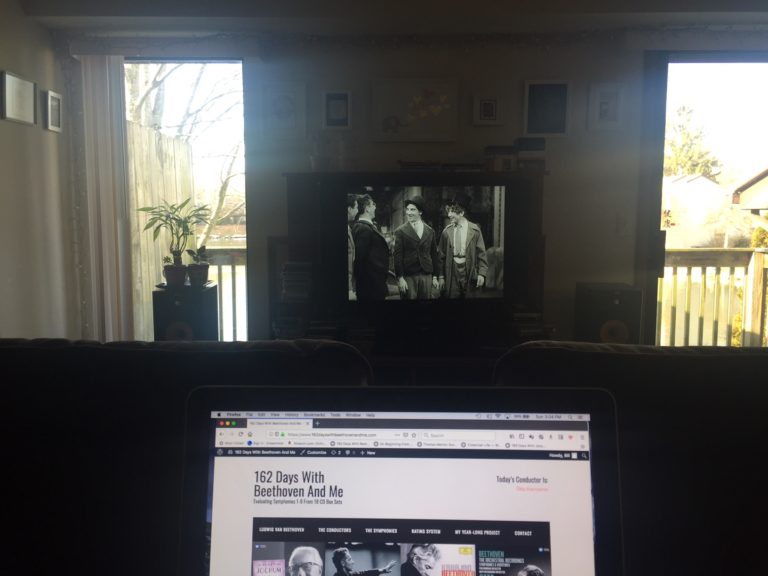
My listening post today is in the living room while the Disney movie Tangled plays in the background.
The background is not for me. It’s for my wife.
She’s in the kitchen cleaning, organizing, arranging (her love languages), and preparing for Thanksgiving dinner later this week. We are hosting it again this year.
I’m sitting here listening to German conductor Otto Klemperer (1885-1973), Philharmonia Orchestra, and Beethoven’s Symphony No. 7 in A major.
Okay.
Tangled ended.

Now the background is for me: The Cocoanuts, the 1929 Marx Bothers film. Granted, I don’t get to hear the rapid-fire jokes (especially from Groucho). But it’s a movie from 1929. By all rights, it shouldn’t be a Talkie, anyway.
Besides, I’ve seen it a thousand times.
Speaking of doing something repeatedly, I’ve encountered Maestro Klemperer six times previously, on…
 Day 12. Rating: “Huzzah!”
Day 12. Rating: “Huzzah!”
Day 30. Rating: “Meh!”
Day 48. Rating: “Huzzah!”
Day 66. Rating: “Meh!”
Day 84. Rating: “Huzzah!”
Day 102. Rating: “Huzzah!”
So, Maestro Klemperer receives four “Huzzah!” and two “Meh!” ratings.
What will today bring?
I’ll soon know.
But first, here’s a brief excerpt from Richard Osborne’s liner notes:
Toscanini’s tempi had got quicker and quicker in his later years. Klemperer’s more now more measured than they had once been. That they did not seem merely slow was due principally to Klemperer’s art of letting the music breathe and dance in a manner he had learnt, in part, from Mahler. “It is important to observe the pauses and to keep the measure of every phrase,” Klemperer once remarked. “This is what breath is to a human being.”
Amen. I would rather a conductor err on the side of slower than quicker. A rapid tempo distracts me no end. It calls attention to the musicians, rather than the music.
Howard Hawks directed the Cary Grant/Rosalind Russell movie His Girl Friday in such a way that the actors purposely talked more quickly, even stepped on each other’s lines.
That was okay, because it was a “screwball comedy.” It was supposed to sound slapdash.
But Beethoven’s music is not a screwball comedy and should be played with great joy, reverence, and with its author clearly in control of the notes.
This is especially important in the all-important second movement to Beethven’s Seventh. If the tempo is too quick, the emotional weight of what he wrote is lost.
I appreciate a conductor who lets the music breathe.
 Beethoven wrote his symphonies in four parts (except for the Sixth, which is in five). The time breakdown of this particular one (Symphony No. 7 in A major), from this particular conductor (Klemperer, at at 75) and this particular orchestra (Philharmonia Orchestra), at this particular time in history (October 25, November 19 & December 3, 1960) on this particular record label (Warner Classics) is as follows:
Beethoven wrote his symphonies in four parts (except for the Sixth, which is in five). The time breakdown of this particular one (Symphony No. 7 in A major), from this particular conductor (Klemperer, at at 75) and this particular orchestra (Philharmonia Orchestra), at this particular time in history (October 25, November 19 & December 3, 1960) on this particular record label (Warner Classics) is as follows:
I. Poco sostenuto – Vivace……………………………..14:04
II. Allegretto………………………………………………………10:02
III. Presto – Assai meno presto (trio)……………….8:43
IV. Allegro con brio…………………………………………..8:39
Total running time: 41:28
My Rating:
Recording quality: 4 (barely noticeable tape hiss, missing a bit of top end, a few ambient noises, otherwise a fine recording despite its age)
Overall musicianship: 5 (sounds inspired)
CD liner notes: 4 (standard Warner Classics booklet with lots of information, and an essay about Klemperer in English, German, and French)
How does this make me feel: 5 (“Huzzah!”)
This another very fine recording of a delightfully lyrical performance. The orchestra sounds inspired, energetic, and joyful – seemingly reckless at times (Movements III and IV), and somber at others (Movement II).
This is a performance that I could recommend to people if the want to know what Beethoven’s Seventh is supposed to sound like.
“Huzzah!”
Here is a video clip of Maestro Klemperer playing the Seventh in its entirety.
NOTE: This is not the performance I heard today. The video clip was recorded 10 years after the one I heard. This was recorded in 1970 – three years before the great conductor died.
Enjoy!
